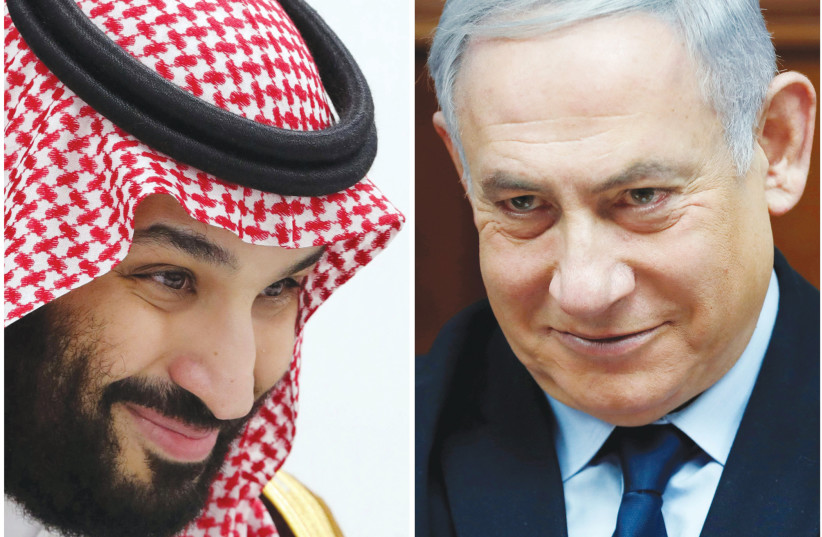The responses of Israeli elites to statements from New York Times columnist Thomas Friedman and the White House concerning the potential recognition of Israel by Saudi Arabia reveal a fundamental misunderstanding of the Middle Eastern mindset. Instead of recognizing the intricacies and complexities of diplomatic relations, they hastily emphasized the benefits of such recognition, benefits that are evident to the Saudi authorities themselves and require no endorsement from Israel.
The enthusiastic response from Israelis served only to weaken their negotiating stance. After all, prudent Middle Easterners do not extol a product in the marketplace before haggling over its price. These impulsive reactions underscore a larger misconception among Israelis about the cultural and value systems that shape policies in the Middle East, particularly in Saudi Arabia.
Numerous Israeli commentators assume that because both the United Arab Emirates and Saudi Arabia are Arab Gulf autocracies, the Saudi monarchy will follow the UAE’s path in normalizing relations with Israel. This perspective overlooks the profound ideological and strategic differences between the two nations.
What Israel is overlooking in diplomacy with Saudi Arabia
The UAE has focused on positioning itself as the cosmopolitan commercial and financial hub of the Middle East and South Asia, even accommodating the construction of a Hindu temple to cater to the spiritual needs of South Asian guest workers. In contrast, Saudi Arabia, as the guardian of Islam’s holiest sites, takes immense pride in its role as the spiritual heart of the ummah, the worldwide community of Islamic believers.
While Saudi Crown Prince Mohammed bin Salman (MBS) may aspire to emulate the UAE’s economic and technological progress through normalization with Israel, the Saudi kingdom would face significant repercussions for such recognition. Deep-seated Muslim animosity toward Israel and Zionism persists, extending beyond self-interested elites to permeate the Arab and Muslim world.

Even more democratic Arab nations, like Tunisia and Iraq, deeply harbor anti-Israel rhetoric and policies. Acknowledging Israel could tarnish Saudi Arabia’s standing in the Muslim world, particularly among detractors who view its leaders as pro-American. Moreover, such recognition could bolster nations like Iran and Indonesia, which also vie for the spiritual leadership of Islam; not to mention Qatar, a pro-Muslim Brotherhood ideological adversary wielding considerable influence in the Arab world via its Al Jazeera Media Network.
These challenges are compounded by the composition of Israel’s current government coalition. The statements and actions of Israeli leaders, especially concerning religious sites like al-Aqsa Mosque and the Palestinian state issue, complicate any potential peace agreement with Saudi Arabia. This is especially true considering that any escalation leading to loss of life in Gaza or Lebanon after such an agreement could damage the reputation of the House of Saud.
To contextualize the religious and ideological barriers facing Saudi elites, it’s worth noting that the Vatican only established diplomatic relations with Israel in 1993, much later than all other Catholic countries. This reluctance was driven by sensitivity surrounding Jerusalem and the Holy Land, a sentiment even more pronounced among Muslim leaders.
Unlike the ecclesiastical Canon Law, Islamic jurisprudence asserts ownership over both Jerusalem and the Land of Israel.
In light of these factors, the most pragmatic approach for Israel in the short and medium term is to expand informal economic, scientific, and cultural ties with Saudi Arabia that do not carry the stigma of official Saudi recognition. Over time, these connections can foster relationships and yield benefits that may overcome die-hard opposition to Israel.
Israeli and Jewish leaders should also lay the groundwork for diplomatic relations with Muslim nations by supporting Jewish-Islamic dialogues led by figures like Rabbi Dr. Yakov Nagen (director of Ohr Torah Stone’s Blickle Institute for Interfaith Dialogue and Beit Midrash for Judaism and Humanity) and Rabbi Ben Abrahamson (director at AlSadiqin – Institute for Historical Research in Islam and Judaism and its Association of Islamic and Rabbinic scholars of History and Jurisprudence).
Furthermore, sponsoring the translation and dissemination of materials about Judaism, Jewish history, and Israel in languages spoken by Muslims, particularly Arabic, will bolster legitimacy and support for these relationships.
Recent Saudi actions and reactions underscore that using discussions about Saudi attitudes toward Palestinians to impress his voter base is an ill-advised path for Netanyahu.
“You are definitely right. Unfortunately, Israeli politicians, Bibi included, do not understand the Arab and Islamic mindset and therefore make mistakes on [the] Right, Left, and Center.”
This was the response I received after urging a leading Israeli expert on the Arab world to teach Netanyahu the basics of good manners in the Arab world, or adab, and sending him the following message:
“I’d like to point out a crass misstep Bibi made a few days ago. When he told Bloomberg that the Palestinian issue is no obstacle to normalization with Saudi Arabia since the issue is barely raised by Saudis during negotiations, he messed up big time. Why?
“Because to make the Saudi monarchy, the custodian of Islam’s holiest sites, look unconcerned about the fate of Palestinians and al-Aqsa, can only be construed by the ummah as a slap in the face. A few days later, MBS returned the slap by letting the world know that he was in no hurry for normalization with Israel, especially with the current government. This statement, which many sabras might even have welcomed as refreshingly honest, reassured the Arab and Muslim world that MBS views Israel, and especially Netanyahu, as a supplicant that must wait at the door. Soon afterward, MBS turned the slap into a punch by unilaterally recognizing the ‘State of Palestine’ and designating a Saudi consul to Jerusalem.
“If Netanyahu, during his interview with Bloomberg, had instead highlighted that Saudi Arabia believes that normalization with Israel will secure peace and progress for Palestinians, he would have made no concessions at all to Palestinians and avoided gratuitously humiliating the peace partners he courts.”
The writer is an independent political analyst specializing in Middle East politics and can be reached at rafaelcastro78@gmail.com.
